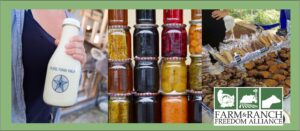UPDATE 4/4: Raw Milk & Cottage Foods
April 4th Legislative update:
The Texas legislative session has 59 days to go and is moving into high gear!
Below is an update on where our local food bills stand. But before we get to that, a reminder to mark your calendar for the May 6th lobby day! This will be the final opportunity this year to come talk with legislators and staff as we fight for important reforms for our farmers, ranchers, and local food producers.
Now on to the latest news:
Cottage foods: The House Public Health Committee hearing on HB 2588 on Monday went great! This bill significantly expands the options for Texans to make foods in their home kitchens and sell them (a/k/a cottage food operations). It raises the sales cap to $100K and indexes it for inflation, allows the sale of almost all foods directly to consumers (except for meat, poultry, seafood, raw milk, and low-acid canned foods), creates new protections against local health departments requiring permits, and allows limited wholesale sales of non-potentially hazardous foods, along with additional small expansions such as allowing easier sampling of cottage foods.
In addition to FARFA’s executive director, there was testimony from the Institute for Justice and two cottage food operations, explaining the incredible value of the existing law and the importance of these reforms. Two individuals testified in opposition, mostly along the lines of “we have to comply with all these burdensome regulations, so everyone else should, too.”
We followed up with the committee members at our local foods lobby day on Tuesday, and most of them seemed favorable, so we’re hoping that the bill will be voted out of committee next week. If successful, the next step will be the Calendars’ committee, where we’ll have to push for it to be set for a vote by the full House.
In the meantime, SB 541 – a great, although somewhat less broad, cottage foods expansion bill – has passed the Senate HHS Committee and is waiting for the first local & consent calendar to be set.
Raw milk: The raw milk bill also got a hearing on Monday, and it was intense. The committee members listened to the testimony, and then questioned FARFA’s executive director and the witness for the Dairymen’s Association (the industry guys opposed to the bill…) for an hour! There was lots of confusion over what raw milk is, the current laws, what people actually do in practice, and so much more. It became clear that the only way we were going to get the “buying clubs” formally recognized was to agree to licensing and inspections requirements – just for individuals to place an order and store the milk for a few hours. So that portion of the bill will be removed. We are optimistic that a revised version of HB 1669, to legalize off-farm sales (including at farmers’ markets without pre-ordering) will be approved next week as well.
Watch both hearings at https://house.texas.gov/videos/21501 The raw milk bill hearing starts around the 30 minute mark; the cottage foods bill hearing starts around the 6 hour, 11 minute mark (yes, we were there all day!)
----
We also monitor and get involved in bills that aren’t on our “priority” list but that have important implications for small farmers and local foods.
Water: Bluntly, water law and policy in Texas is terrible. But there are a couple of good bills that have been introduced and were approved by the House Natural Resources Committee this week. HB 1633 would require groundwater conservation districts to consider the impact on “exempt wells” – the wells providing rural landowners with their domestic and livestock water – when granting or denying a permit. HB 1690 provides for more notice to the community when there’s an application to transfer groundwater out of the district.
Compost: SB 2078 grew out of a dispute in Lee County where local residents grew angry at Austin’s mandated composting of food waste being brought to their county. Most of the issues raised, such as potential water contamination, grew out of misunderstanding about composting, conflating it with activities such as rendering or sewage sludge. SB 2078 as filed would have allowed counties to ban any composting operation within 1,000 yards of almost any kind of water – effectively giving counties veto power over compost operations whether they posed an actual problem or because of NIMBYism or because a landfill company spread false rumors. We are in discussions with the bill sponsor to amend the bill and will keep you posted.
# # # #
